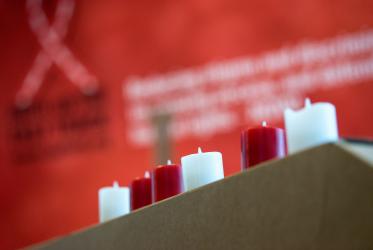“Is there a way we can address stigma and discrimination among faith communities, to set an example, so that those who are there to provide services, to give care, do not themselves stigmatize? Because when it comes to HIV and AIDS, it doesn’t matter if we are Christians or Muslims, women or men. With HIV and AIDS, we need to deal with it as human beings.”
UNAIDS representative Juliene Munyaneza gives introductory words at a national interfaith HIV consultation taking place in Nairobi, Kenya on 11-13 October, a consultation that forms part of a two-year PEPFAR-UNAIDS faith-based initiative intended to strengthen the capacity of faith community leaders and organizations to advocate for and deliver a sustainable HIV response.
“We know that faith communities are key in overcoming HIV,” explains Katherine Perry, Kenya coordinator at PEPFAR. “Religious leaders have powerful voices in mobilizing people to take up testing, treatment and care, and we simply cannot do this without them.”
Rev. Dr Nyambura Njoroge, coordinator the World Council of Churches Ecumenical HIV and AIDS Initiatives and Advocacy, continues, “As faith representatives, we know that we do not only need to see to the medical treatment, but also focus on the social drivers, the social justice aspect to treatment. If you neglect the social justice issues related to HIV, then you will not get anywhere.”
Irene Kizito, national general secretary of the National Young Women’s Christian Association in Kenya, stresses the importance of broad networks in working against HIV. “In attending this consultation, from the YWCA we hope to contribute with our knowledge of what it means to be active both on the most local level, and to collaborate with organizations and institutions at the national and international levels,” Kizito says.
But how can we support dialogue and understanding between faith leaders and key populations, in particular youth and adolescents in questions related to HIV? A particular focus of the consultation was intergenerational dialogue, on questions of testing, treatment, stigma and discrimination, gender roles and sexual violence, and the consultation sets out to create safe spaces for sharing experiences across generations.
Harriet Kongin, adviser for policy and strategy at UNAIDS Kenya, reflects, “Looking back, ten-fifteen years ago, we can see that our work was all to do with awareness-raising. Today, the questions are different. We see now many opportunities in partnering and journeying with youth, to mobilize around messages around HIV. But we should not plan for young people, we should work with them, and listen to them.”
“I believe intergenerational dialogue and safe spaces are a way for youth to share and for the older generations to understand what exactly is happening in the lives of adolescents, and to see where there is an age-gap that we need to overcome,” says Brian Otieno, peer mentor at INERELA+ Kenya. “Through this safe space dialogue, I hope religious leaders can change their points of view, their angle of view, to understand better and keep an open mind to the issues that affect young people.”
Njoroge continues, “how can we not know how to do intergenerational dialogue, when our children are the most vulnerable to HIV infection? Given what we know today, even one newly infected child is one too many.”
“At the end of the day, we must dare to ask also the hard questions,” Njoroge concludes. “What is the point of a child being born negative if by the age of 15 they have been infected anyway?”
The consultation in Nairobi will be followed by a similar consultation in Lusaka, Zambia on 19-21 October. Each culminates in a roadmap and call-to-action to guide implementation of the PEPFAR-UNAIDS faith-based initiative, and ultimately forms part of the UNAIDS 2016-2021 strategy On the Fast-track to End AIDS. A shared platform for both countries will also be established to develop national faith action plans for 2017.
WCC Ecumenical HIV and AIDS Initiatives and Advocacy (EHAIA)









